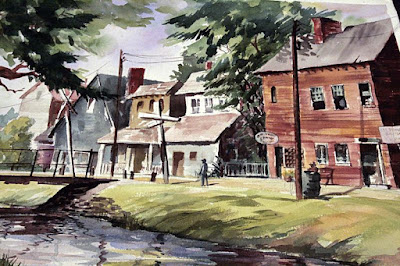Homework for September 21 - Herman Melville, "The Piazza Tales"
Just found this quote, from one of the "fast-read" sites:
in Shmoop Editorial Team. "The Piazza Tales Tone." Shmoop. Shmoop University, Inc., 11 Nov. 2008. Web. 19 Sep. 2017.
Do you agree? Why (not)? Offer your version of what you found more (un)interesting in the story.
Longing
"The Piazza" has little in the way of plot or character; even its setting is vague and misty. Almost all there is to it is a tone of dreamy, elaborate longing. The narrator longs for a piazza, and then when he gets the piazza he uses it to sit and long to be off into the hills to fairyland. That longing is then mirrored back in Marianna, who longs to meet the inhabitant of the narrator's cabin. Marianna may or may not be a dream—the uncertainty about what is real and what isn't adds to the sense of wistful, uncertain desire that covers the story like a wet Kleenex.in Shmoop Editorial Team. "The Piazza Tales Tone." Shmoop. Shmoop University, Inc., 11 Nov. 2008. Web. 19 Sep. 2017.
Do you agree? Why (not)? Offer your version of what you found more (un)interesting in the story.


The line which reads “ ‘The Piazza’ has little in the way of plot or character...almost all there is to it is a tone of dreamy, elaborate longing” very accurately sums up my experience reading “The Piazza.” Because we are given relatively little information about the narrator, the setting of the story and the author’s use of deeply descriptive language takes center stage. We learn about the narrator not through a typical description of his personal characteristics, but rather through the expression of his longings and desires. We learn at once, through his desire to own a deck which overlooks the magical landscape in which he lives, that he is a dreamer. Hawthorne's use of a “show don’t tell” strategy to develop the character fits in well with the imaginitive language used to describe the natural landscape.
ResponderExcluirWhat was also very interesting (and perhaps coincidental?) was the appearance of a shadow in this story. When the narrator climbs the mountain to visit the inhabitant of the “fairy house,” he meets a girl who insists that she has a dog. The narrator is at first perplexed by this claim, but comes to realize that the ‘dog’ is a shadow cast by the sun through the fairy house window. The conversation they have about the mysterious shadow dog brings up a lot of interesting things to consider regarding reality. The girl speaks of the dog as if he is real, but we (as readers) know that this isn’t our typical flesh & blood pet. The narrator asks the girl “...to you, these lifeless shadows are as living friends, who, though out of sight, are not out of mind, even in their faces — is it so?” (15). In this instance the narrator addresses what most readers are already thinking; does this girl really consider fleeting shadows to be true companions? Marianna's reply — “That way I never thought of it” — to the narrator's probe reminds us that reality is only a construct. Is a shadow any less real than the object that casts it? The character’s reaction to the shadow in this story is very different from the characters reaction to the shadow in Poe’s "The Shadow.” In one story, the shadow is a companion, whereas in the other, the shadow is something to be feared. The duplicity of interpretations of shadows that we have come across in class shed light on the power of context and setting to frame the same thing in very different ways.
The quote posted in the prompt is, from my reading experience, an accurate summation of "The Piazza Tales." The tone of the story, does, as the quote mentions, maintain a sense of longing throughout. However, I found that the key components of the story were the elements of fantasy and dreams, also highlighted in the quote. The repeated mentions of fairies and rainbows rendered the story a dream-like quality which informed the reader of the speaker's constantly dreamy state of mind.
ResponderExcluirThis otherworldly quality was further emphasized through multiple elements of the story, including the light imagery and the language of distance. It seemed that the speaker was always looking for something in the distance, whether that be a physical or figurative distance. At first, he longs for a piazza in the future, which is distant in terms of time. Then he longs to go to the mountains he can see from his piazza, which seem far off and distant from his home. Then, through his imagined encounter with Marianna, he longs to meet someone who longs for his house while similarly looking at it from a distance. Everything the speaker describes seems out of reach. Furthermore, the description of light and shadow also lends a dreamlike quality to the story. First, we have the glaring sun glowing off of surfaces and creating bright spots which seem like illusions. Then, in the speaker's encounter with Marianna, we are introduced to moving shadows which Marianna identifies with certainty but which our speaker cannot see in the same way, hinting at yet another illusion. Nothing is clarified or realized in the story. Instead, Melville uses light and distance to wash his story with an intense feeling of longing that has no resolution.
I agree with the author of this "fast-read" summary about the tone of the story being predominantly wistful and longing. However, his/her mentioning this classification of tone in a negative "all there is to it" kind of way does not match up with how I I nterpreted this tone while reading the story. Melville amplifies this tone to such a high degree, as this reader noticed, as a way to accentuate the natural condition of longing that humans share. Though the narrator seems to live a beautiful life in a beautiful home, he longs for the piazza, and even upon reaching the piazza, longs still for something more. Through this chain of events, accompanied by the narrator's detailed thought process, Melville shows the irony of the particular aspect of human nature where people oftentimes opt for a fantasized, idealistic, and often unrealistic goal rather than learning to appreciate or treasure what they have right in front of them.
ResponderExcluir